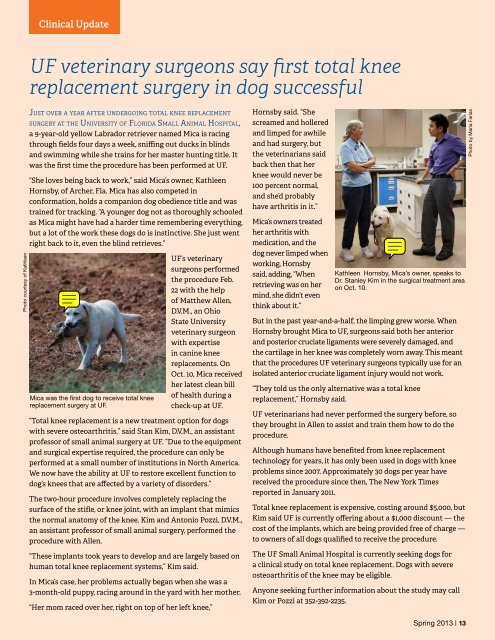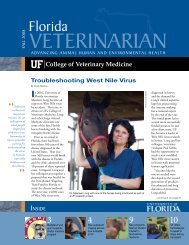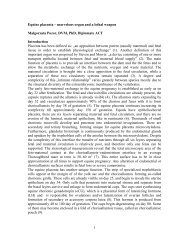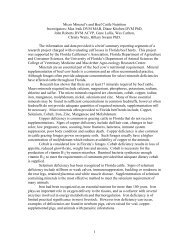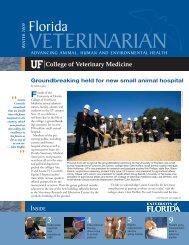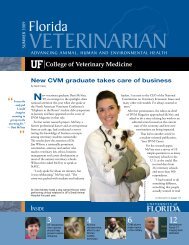Veterinarian - University of Florida College of Veterinary Medicine
Veterinarian - University of Florida College of Veterinary Medicine
Veterinarian - University of Florida College of Veterinary Medicine
- No tags were found...
You also want an ePaper? Increase the reach of your titles
YUMPU automatically turns print PDFs into web optimized ePapers that Google loves.
Clinical UpdateUF veterinary surgeons say first total kneereplacement surgery in dog successfulJust over a year after undergoing total knee replacementsurgery at the <strong>University</strong> <strong>of</strong> <strong>Florida</strong> Small Animal Hospital,a 9-year-old yellow Labrador retriever named Mica is racingthrough fields four days a week, sniffing out ducks in blindsand swimming while she trains for her master hunting title. Itwas the first time the procedure has been performed at UF.Photo courtesy <strong>of</strong> KathleenHornsby.“She loves being back to work,” said Mica’s owner, KathleenHornsby, <strong>of</strong> Archer, Fla. Mica has also competed inconformation, holds a companion dog obedience title and wastrained for tracking. “A younger dog not as thoroughly schooledas Mica might have had a harder time remembering everything,but a lot <strong>of</strong> the work these dogs do is instinctive. She just wentright back to it, even the blind retrieves.”Mica was the first dog to receive total kneereplacement surgery at UF.UF’s veterinarysurgeons performedthe procedure Feb.22 with the help<strong>of</strong> Matthew Allen,D.V.M., an OhioState <strong>University</strong>veterinary surgeonwith expertisein canine kneereplacements. OnOct. 10, Mica receivedher latest clean bill<strong>of</strong> health during acheck-up at UF.“Total knee replacement is a new treatment option for dogswith severe osteoarthritis,” said Stan Kim, D.V.M., an assistantpr<strong>of</strong>essor <strong>of</strong> small animal surgery at UF. “Due to the equipmentand surgical expertise required, the procedure can only beperformed at a small number <strong>of</strong> institutions in North America.We now have the ability at UF to restore excellent function todog’s knees that are affected by a variety <strong>of</strong> disorders.”The two-hour procedure involves completely replacing thesurface <strong>of</strong> the stifle, or knee joint, with an implant that mimicsthe normal anatomy <strong>of</strong> the knee. Kim and Antonio Pozzi, D.V.M.,an assistant pr<strong>of</strong>essor <strong>of</strong> small animal surgery, performed theprocedure with Allen.Hornsby said. “Shescreamed and holleredand limped for awhileand had surgery, butthe veterinarians saidback then that herknee would never be100 percent normal,and she’d probablyhave arthritis in it.”Mica’s owners treatedher arthritis withmedication, and thedog never limped whenworking, Hornsbysaid, adding, “Whenretrieving was on hermind, she didn’t eventhink about it.”Kathleen Hornsby, Mica’s owner, speaks toDr. Stanley Kim in the surgical treatment areaon Oct. 10.But in the past year-and-a-half, the limping grew worse. WhenHornsby brought Mica to UF, surgeons said both her anteriorand posterior cruciate ligaments were severely damaged, andthe cartilage in her knee was completely worn away. This meantthat the procedures UF veterinary surgeons typically use for anisolated anterior cruciate ligament injury would not work.“They told us the only alternative was a total kneereplacement,” Hornsby said.UF veterinarians had never performed the surgery before, sothey brought in Allen to assist and train them how to do theprocedure.Although humans have benefited from knee replacementtechnology for years, it has only been used in dogs with kneeproblems since 2007. Approximately 30 dogs per year havereceived the procedure since then, The New York Timesreported in January 2011.Total knee replacement is expensive, costing around $5,000, butKim said UF is currently <strong>of</strong>fering about a $1,000 discount — thecost <strong>of</strong> the implants, which are being provided free <strong>of</strong> charge —to owners <strong>of</strong> all dogs qualified to receive the procedure.Photo by Maria Farias“These implants took years to develop and are largely based onhuman total knee replacement systems,” Kim said.In Mica’s case, her problems actually began when she was a3-month-old puppy, racing around in the yard with her mother.“Her mom raced over her, right on top <strong>of</strong> her left knee,”The UF Small Animal Hospital is currently seeking dogs fora clinical study on total knee replacement. Dogs with severeosteoarthritis <strong>of</strong> the knee may be eligible.Anyone seeking further information about the study may callKim or Pozzi at 352-392-2235.Spring 2013 | 13


